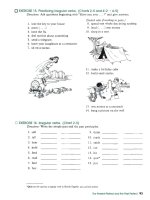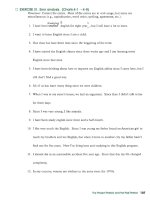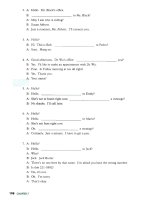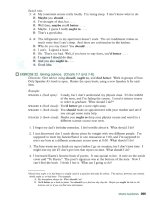Ship or sheep third edition part 2 pot
Bạn đang xem bản rút gọn của tài liệu. Xem và tải ngay bản đầy đủ của tài liệu tại đây (458.48 KB, 7 trang )
tx
DTAGNOSTIC TESTS
All
students should do Test
A.
Test B
requires
the help of a teacher, native speaker or near-native speaker
of English.
The
tests are not to
give
you
a mark. They may help
you
to find out which
sounds and other aspects
of
English
pronunciation
could
be the most
difficult
for
you.
You
should also check this
in
the
ll'sf
of likely errors or'the
website:http://ww\M.cambridge.org/elt/elt_projectpage.asp?id=2500905.
TEST A
Section I Sound discrimination
az
Do
not stop the recording or repeat. In each item
you
will hear two words.
Sometimes
the two words
are
the same.
Sometimes they have
one sound
that is different.
Listen
once only to each
item
and tick the S
(same)
column
or the D
(different)
column. If
you
are
not
sure,
tick the
question
mark
(?)
column.
EXAMPLE If
you
hear,
'sheep
sheep'
tick
the S column.
If
you
hear,
'sheep
ship'
tick the D column.
If
you
are
not
sure,
tick the
? column.
S
D
2
S D
2
S D ?
S
D ? S D ?
la 6a 12a
17a
1b 6b
r2b 17b
2a
7a l3a l8a
2b 7b 13b 18b
2c 7c I4a l9a
3a
8a
r4b 19b
3b Bb l4c 20a
4a 9a r4d 2Ia
4b
9b
l5a 22a
5a
10a 15b 22b
5b
r0b 16a
23a
5c lla
16b 23b
r1b l6c 24a
x
Section
2 lntonation
es
Do not stop the recording or repeat. Listen to Lucy
talking
to
Lesley
on the
telephone.
In
some
items her voice
goes
up
(
)
at the
end.
In some
items
her voice
goes
down
(
.
).
Tick
the
'
or column for each
item. If
you
are not sure, tick the ? column.
Listen
to the example first.
EXAMPLE
a)
That's Lesley,
i#t
ita
b)
That's
Lesley, isn't
it?
Section
3 Word stress
e+
Do not stop the recording or repeat. In each item, tick the one word that is
different
from the others.
EXAMPLE
items
column
number
alone /
listen
I nowhere birthday
mistake toilet
postcard
2
guitar
eighteen today machine English
3
away brother
breaKast
frightened valley
4 comfortable
vegetables
photograph
lemonade
minimal
5
telephoning supermarket conversation exercises helicopter
2 ?
I 6
2
3 8
4 9
5 l0
xi
IEST B
(Note:
This test requires the help of a teachel
native speaker, or
near-
native
speaker of
English.)
Ask the student to
read
each
test item, and record the
grading
on the
result
sheet
(page
xii).
A
student's
performance
can be recorded, or the student can
be asked to
repeat an item as many times
as necessary to record a result,
The reasons
for mispronunciation are
many,
and
some may be caused by
reading
difficulty. To check this, say the
mispronounced word correctly
and ask the
student to repeat it. If the student can
then
say
it correctly, add
the symbol
R
to
your
grading
on that item, indicating that tfie
student can
pronounce
this sound but may
have
difficulty
when reading
it.
Suggested syrnbols
for
grading:
/ no difficultywith
this sound
X difficulty
with this
sound
R may have difficulty
reading this sound
Shopping
list
1 some cheese
(cheap
cheese);
some tea
(Chinese
tea)
2
titty biscuits;
four fish
3 ten eggs
(big
eggs)
4
jam;
apples and oranges; a cabbage
5 ten tomatoes
(large
tomatoes)
6
five kilos ofveal
(verygoodveal)
7 some strong
string
(long
string)
8
four forks
(small
forks); spoons; cups; small
paper plates
9 some
good
sugar; milk; coffee; a cake
10
pick
up
Iude's
blue
shoes at the shoe shop; two
kilos of brown
rice; a
grapefruit
1l nuts; honey; half a dozen
hot
buns
12 one lemon; nine brolrm onions;
flowers for the
house
13 some
paper for my mother's letters; collect Grandfather's
leather
jacket
from
the cleaner's
14 a
girl's
shirt and skirt
(size
thirteen); cold drinks
(don't
get
dry
ginger);
some
good
bread
15 eight small cakes
and
paper plates;
some sausages
for supper
16 some
yellow roses for
your
sister
17 white
wine
(sweet
wine); some lce
18 beer
for Bob
(buy
it from the
pub
near here)
19
some shampoo
for Claire's
hair;
some
pears
20 some tins of
New Zealand
peas,
or frozen beans
21 fresh English fish
from
the
fish
shop
22
atoy
for the little boy
(a
blue or
yellow
ball)
23
something
for Mr Smith
(it's
his
birthday
on Thursday)
24
a small
cheap television for the
garage
RESULTS SHEET AND
FINDINCS from
List of likely
errors
In any of the three
columns,
place
a cross
against the
sound where there may
be difficulty.
SOUNDS
/t"[i
(ctri
r20
3
/e/
(pen)
101
4 le,l(man)
124
5
/qr/
(heart)
/t/
(table)
6 /v/
(van)
7
/o/
(clock)
168
8
/crl
(ball)
174
9 /u/
(book)
l0
/ur/
(boot)
/r/
(rain)
1l /,ri
(cup)
/h/
(hat)
147
12 /n/
(nose)
165
/aui
(house)
13 /e/
(camera)
/d/
(the
feather)
155
14 lstl
(girl)
/d/
(door)
L5 letl(male)
/s/
(sun)
107
16 laul(phone)
/w/
(window)
139
143
57
17 larl
(ftne)
l8 /re/
(year)
19 leal(chair)
/m/
(mouth)
162
20 lzl
(zoo)
110
2r /f/
(shoe)
114
/l/
(letter)
172
23
/0/
(thin)
(Diagnostic
Test
B)
Findings
from
List
t31
11
15
13s
8I
97
176
t9
l4a, l4b, I4c
151
24
ftl(television)
Il7
Section
A
Vowels
Making English
sounds
Use
vour
voice to make all vowels.
short
vowels
(make
a short sound)
A/
(ship)
/e/
(pen)
/u/
(book)
/a/
(man)
h/
(cup)
/o/
(clock)
/a/
(camera)
longvowels
(make
a
long
sound)
/c:/
(ball)
/u:/
(boot)
/irl
(sheep)
/c:/
(heart)
/s/
(girl)
diphthongs
(two
vowel
sounds)
/eu/
(phone)
/rel
(year)
lctl(boy)
/aul
(house)
/e/
(male)
/arl
(fine)
/eel
(chair)
$
rur,ur
Spot the different sound.
EXAMPLE
lal
lel
lul leal ltl
Answer:
The fourth sound is a diphthong.All
the others are
short
vowels.
I
leul
lul lrl lal
ltl
2 lcrl
lel
lrcl
latl laul 3 lol
li'.| lczl lszl lgzl
Match
these words
with
the
pictures
below.
a the back
of the
tongue
b
the lips
c
the tip of the to
d the front of the
Match the
pictures
(1-9)
in A with the
instructions
(a-i)
in B.
A
ngue
tongue
t
,C
€
I
t_-
,I
Open
your
mouth.
Close
your
mouth.
Put
your
tongue
forward.
Open
your
mouth a little. Then open
mouth a little more.
Put
your
tongue back.
Put
your
tongue down.
Put
your
tongue up.
Put
your
tongue forward and
up. Practise lill: eat, easy, he, she,
we.
Fut
your
tongue
down and back.
Practise
/ol/:
ask, are, arm, car.
B
a)
b)
c)
d)
e)
f)
I
h)
i)
lul sheep
- Do
vou
like
your
tea sweet?
- l-es. Three
sugars,
please.
Target
sound /irl
\5
Open
your mouth very little
to make
the target sound
ir.
/irl
is
a
long
sound.
Listen
and repeat: /irl.
c
2 Sound
/irl
,6
rr \d
,"''
t':'
.1 t
sheep
Look out for that sheep.
cheeks
What lovely
cheeks!
bean
Throw out that bean.
Stop
it leakingl
This
pcel's got
vitamin C in it.
He's
going
to
leave.
"€
6l
Irf,
&,
&
ffi
,s
fl w.'
\t'
&
Sound /i:/ words
eo a
Listen
and
repeat
the
words.
Sound /irl sentences
ez b Listen to the sentences.
'r;
c
Sentence
stress
Notice that the most important words for the meaning of a sentence are
pronounced
more LOUDIy and s I o w Iy .
The less important words are said more
quietly
and
quidd5l
Listen to
the sentences again and this time
look
at the underlined
syllables below.
Notice
that they are
louder
and slower.
Look out for that sheep.
\Mhat lovely cheeks!
Throw out that bean.
leak
Stop it leaking!
Peel
This
peel's
got vitamin
C
in it.
leave
He's
going
to
leave.
nz
d Listen again
and
repeat the
sentences.









